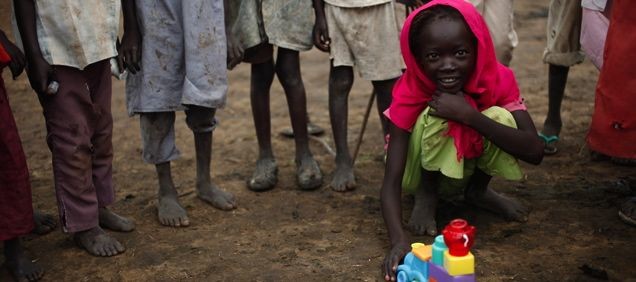Primary school teachers at Doro Refugee Camp in South Sudan’s Maban County say they have stopped teaching in protest of a delay in payment of their salaries.
Education has suffered in South Sudan since the start of the national crisis mid-December, especially in Upper Nile State where schools are closed or disabled in much of the state.
Although Maban County has been generally calm compared to other areas of the state, many NGOs evacuated their staff temporarily and aid operations suffered from fuel shortages because insecurity cut off barge access between Juba and Malakal.
Since last week teachers told Radio Tamazuj they have stopped teaching at five schools run by Save the Children organization in the Doro area, which serve nearly 10,000 children.
Most of the children are residents of Doro camp, one of four in the county where about 120,000 refugees from Blue Nile State are taking refuge since 2011.
Speaking to Radio Tamazuj, several teachers expressed resentment at a salary delay, among other grievances. “Our salaries have not been paid since January. But if we talk of such issues our contract can be terminated by the organization, so this is the situation we are in. Therefore we are on an open strike,” said teacher Philip Simon Duku.
Dal Luka, a headmaster of Balila School, said they also want a clear academic calendar, vacation days, and more textbooks for students. “When the teacher is absent for health reasons his salary is deducted by the organization,” he claimed.
NGO says ‘no strike’
Save the Children, in a statement to Radio Tamazuj, acknowledged the delay in paying salaries, explaining they had agreed to pay January dues but were “awaiting funds from our head office to be able to fulfil our commitment to the teachers.”
“This process has been slower than usual because of the reduced capacity of teams in both Juba and Maban, following the recent crisis in South Sudan,” the NGO explained.
Save the Children denied, however, that there was a strike at the schools they run in Doro camp, saying the teachers “are not on strike.”
The organization also clarified that all of the teachers in the schools are employed on volunteer contracts, in accordance with a government policy.
Dafalla Allega, a teacher at Al Nur Primary School, confirmed to Radio Tamazuj that the strike will continue until their demands are met. According to the same teacher, however, the ‘striking’ teachers are actually still reporting to work at the schools in the morning, but refusing to teach classes.
Paul Joseph Jabir, a teacher at Jamhour school, said the major problem is that Save the Children does not heed the teachers’ views. “For instance, I had served as a headmaster in Kurmuk town in Blue Nile State but when I came here I demoted myself to be a teacher,” he said.
“We request good staff to be recruited by Save the Children to cooperate with us. If not, the strike will continue,” emphasized Jabir.
‘Majority of teachers continuing’
Schools in Maban reopened on 10 February, after a long ‘Christmas break.’ The teachers last week held a number of meetings with Save the Children together with the UN Refugee Agency (UNHCR). According to the education organization, the meetings were intended to allow for dialogue, discussion of next steps and resolution of the situation.
“There has been no disruption to the education offered to children in Doro camp. The vast majority of teachers are continuing with their vital work, and we are in discussions with a small number of individuals to ensure they are able to return to their classrooms next week,” the organization stated.
Daffalla, on the other hand, said that he and other teachers walked out of a recent meeting with the NGO, feeling ‘provoked.’ He said, “Therefore we are abstaining from teaching until our demands are fulfilled.”
Last week the same teacher told Radio Tamazuj, “In case this organization remains funding the education process in Doro camp, the education of our children will be at risk,” and he called on the donor community to replace Save the Children with another more effective education organization.
Save the Children has been working in Doro Camp since 2012. The organization says it has constructed 40 classrooms, repaired 30 temporary classrooms, distributed more than 23,000 textbooks and trained 150 teachers. “We hope that despite the challenging situation in South Sudan this year we will be able to build on and expand this work,” the organization stated.
Photo: A girl plays with a toy train at a UNICEF-supported ‘child-friendly space’ at a refugee camp (UNICEF/Brian Sokol)




